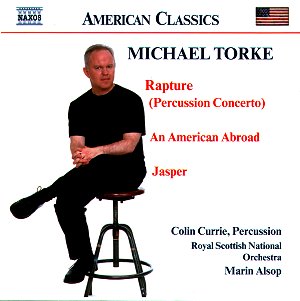In a vintage year for Naxos, this disc will probably
rank in my top six of the label's output. While it cannot touch the
Lilburn, Moeran and Tveitt discs for emotional intensity, it provides
further evidence of the burgeoning talent of the contemporary American
composer Michael Torke. His work is tonal, melodic and positive in outlook;
you may be aware of some his earlier CDs on the now sadly defunct Argo
imprint or possibly his superb Javelin, written for the Atlanta
Olympiad in 1996. In the latter he managed to bring together some of
the lyrical aspects of Sibelius's later, more concise nature painting
(especially symphony No. 6) with overtly American elements (the outdoor
atmosphere of Copland, the jazz inflections of Gershwin and Bernstein).
I am happy to report that this new disc, containing
world premiere recordings of compositions written in Torke's capacity
as the Associate Composer of the RSNO, continues in much the same vein.
Additionally, it provides, in the concerto, a wonderful showcase for
the brilliant young Scottish percussionist Colin Currie, who is following
very much the same starlit trajectory as Evelyn Glennie before him.
An American Abroad is probably the most romantic
piece on the disc. I use the term "romantic" in the same sense that
it might apply to many of John Adams' (an obvious point of reference)
recent works. Superbly orchestrated, it moves through various moods,
from fairly florid impressionism to Coplandesque "outdoor" music. It
is meant to express "the natural naïvety an American might feel
when travelling abroad" but is in no way simplistically programmatic.
It is an enjoyable piece in which the different sections blend seamlessly
to form a satisfying whole. Extended in duration, probably the only
criticism that could be laid at Torke's door here is that the material
is not treated as economically as it might have been; not a comment
that could be applied to the following piece Jasper. The latter
was inspired by the surroundings (Lake Superior) in which it had its
genesis and its shape-shifting but highly melodic nature music is archetypal
Torke. The composer's always informative booklet notes emphasise its
unique employment of "each of the seven pitches of the diatonic scale"
but knowledge of this fact is hardly essential to an appreciation of
the piece.
Torke cites a late W.B. Yeats poem (News for a Delphic
Oracle) as the inspiration for Rapture, his percussion concerto,
an attempt to unite "the religious with the sexual"! I am not sure that
this aim is achieved but the music stands up well against similar recent
works. Colin Currie has also recorded James MacMillan's Veni, Veni,
Emmanuel for Naxos (a performance that is in no way diminished by
comparison with Evelyn Glennie's original) and it must be said that,
in comparison, Torke's work is more accessible and tuneful but ultimately
less deeply affecting. It is a brilliant orchestral spectacle, in which
the RSNO, under the mercurial baton of Marin Alsop, supports the soloist
superbly, but Torke may have done himself no favours by giving so many
clues to the piece's inspiration. Rightly or wrongly, W.B. Yeats is
associated, musically, in this listener's mind, with Arnold Bax and
his ilk. As an entertainment, it is great fun but it doesn't really
hit the emotions that much. The three movements are titled after the
main percussion instruments used (e.g. the second is Mallets).
This reminds us of Steve Reich and, in fairness, the concerto is where
Torke comes closest to the minimalist mainstream.
The best music on the disc, and very good it is too,
comes in the latter stages of An American Abroad and in Jasper,
where rather more lofty and enduring antecedents are effectively invoked.
I would recommend this CD, particularly at bargain price, to anyone
interested in contemporary American music. Like Aaron Jay Kernis, Michael
Torke is a composer to be treasured and hopefully nurtured to even greater
things.
Neil Horner

